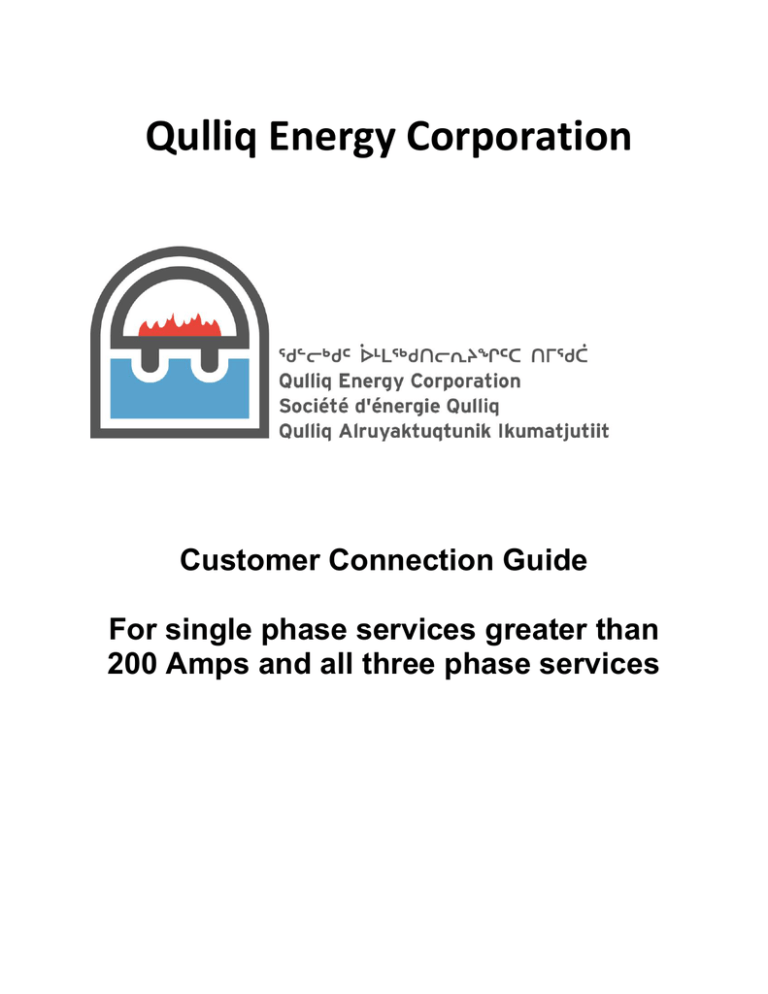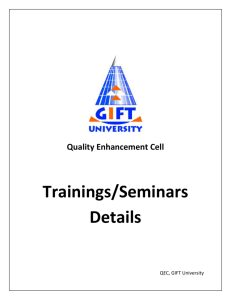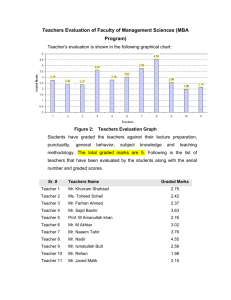- Qulliq Energy Corporation
advertisement

Qulliq Energy Corporation Customer Connection Guide For single phase services greater than 200 Amps and all three phase services Customer Connection Guide Single Phase Services Greater Than 200 Amps And All Three Phase Services Preamble The Canadian Electrical Code (CEC) specifies that the supply end of a service shall be installed in a location mutually agreed upon by the territorial electrical inspection department and the supply authority (Qulliq Energy Corporation). The service connection point must allow the Qulliq Energy Corporation (QEC) ease of service installation, maintenance, and meter access at all times. Clearances from building windows, stairs, roofs, balconies and service conductor horizontal and vertical clearances must be comply with the minimum requirements set by QEC. The following sections of this guide amplify sections of the CEC pertaining to supply services and related plant for single phase services greater than 200 Amps and all three phase services. General Guidelines Service Heights The customer is responsible for providing a point of attachment that meets the requirements of both the CEC and QEC. The point of attachment shall not exceed 9 meters above finished grade. Greater than 9 meters would require written permission by the engineering department of QEC after an assessment has been completed and the height has been justified. The following table state height requirements for services crossing over different ground surfaces. The point of attachment shall be located such that the clearance of the supply conductors (i.e. drop wires) meets requirements of the table below; Location of Wires or Conductors over; Highways, street lanes and alleys Driveways to commercial and industrial premises Driveways to residences or residence garages Clearance in Meters (Feet) 6.4 (21) 5.9 (19.5) 5.4 (18) Work Space The work space to access overhead service masts require enough horizontal clearance at grade level, between the base of a ladder and it’s resting place on the building, to satisfy both QEC climbing standards and the Workers’ Safety and Compensation Commission regulations on safe ladder use (typical ladder slope of 4:1 is observed). This ensures the installation will be done safely by our installer and the service supply wire can be strung easily along the ground during installation. The work space for underground services feed by a pad mounted transformer require proper easements to be kept to allow QEC personnel access for maintenance and repair activities. An easement of four (4) meters must be kept around the transformer at all times to ensure easy access. Page 1 of 5 Last Modified: 2014-07 Customer Connection Guide Single Phase Services Greater Than 200 Amps And All Three Phase Services The work space of 1 meter shall be provided and maintained in front of all metering equipment. Service Location Prior to the commencement of any electrical work, the customer should contact QEC to confirm the location of the service attachment point. This information shall be identified in a site plan drawing supplied with the QEC Electrical Service Application form. For overhead services, the location of the attachment point (attachment spool) shall be in direct sight of QEC’s power pole with no ground obstructions. The attachment point shall also be on the same side of the building facing the direction of the nearest power pole; or no further than 1 Meter (3 feet) back from that wall, on either side of the building. If a roof mast is used to maintain the minimum clearance above grade, it must be located a reasonable distance from the edge of the roof within reach of the installer’s ladder. For underground services, the location of the secondary riser pole or pad mount transformer shall be confirmed in consultation with QEC. Pad mount transformers shall be installed at least 6 meters from a building; or no closer than 3 meters provided that a non-combustible wall or barrier is installed between the pad mount transformer and the building. Metering Meters installed outdoors shall be installed in locations that are easily accessible. The meter shall be installed at a height not less than 1.6 m or more than 1.8m above the finished grade (measurement taken to the meter face). The construction of fences, porches or other buildings shall not restrict access to the meter. With bottom connected metering service(s), the test-switch in meter cabinet, outdoor or indoor type, can be located a maximum distance of 7.6 meters (25 ft) away from the instrument transformer(s) in the instrument transformer cabinet. Meters installed indoors should be located in a separate electrical room within the building. The meters, unless they are a component of an approved metering centre, shall be installed at a height not less than 1.2 m or more than 1.8m above the finished floor (measurement taken to the meter face). Meters installed on metering centres must be installed at a minimum height of 45 cm above the finished floor. If the electrical room containing the meter is to be locked at all times, the customer shall install a lock box at their expense. The lock box should be located at the electrical room entrance and the customer shall provide QEC with a key for the electrical room. QEC will provide the lock box upon request. For row housing or similar multi-tenant dwellings, the customer may choose to locate the meters in a separate electrical room within the building. Requirements of this room must meet CEC rule Page 2 of 5 Last Modified: 2014-07 Customer Connection Guide Single Phase Services Greater Than 200 Amps And All Three Phase Services 6-206 and have the following QEC standards; the door to the electrical room must open inwards at all times and be free from obstructions, such as snow, and the electrical room shall not be cluttered with items (i.e. not to be used as a storage room) and should be readily accessible by QEC employees for meter reading. The Corporation shall provide, install and seal all meters necessary for any measurement in connection with the service supplied to a customer, unless otherwise specifically provided in a contract with the customer. With self-contained metering service(s), the Customer shall supply and install CSA approved meter socket(s). For bottom connected metering service(s) requiring instrument transformers, the Customer shall supply and install CSA approved meter cabinet and instrument transformer cabinet in accordance with rule 6-402, 6-404 and 6-406 of the Canadian Electrical Code. If meter cabinet will be installed outdoor, it will be CSA approved weather proof cabinet. Any instrument transformer(s) will be supplied by QEC. The Customer is responsible for the installation and primary connection of the instrument transformer(s) and will ensure the work is carried out by a qualified journeymen electrician on behalf of QEC. Standard metering configurations will be installed in accordance with QEC Revenue Metering Standards. Single Phase Services greater than 200 Amps Assessing Service Entrance Type & Configuration When planning the electrical service for single phase services greater than 200 Amps, several factors must be considered besides the physical location. Depending on the size of the load, voltage, and demand requirements the service may consist of underground or overhead construction. The customer may, for esthetic reasons, request a service be installed a certain way. This is acceptable as long as it meets requirements of QEC and the CEC prior to construction. Standard single phase service (greater than 200 Amps) configurations available from QEC; • • Single phase, 3 wire, 120/240 volt Network, 3 wire, 120/208 volt Note: Single phase services up to 400 Amps. Services greater than 400 Amps should consider conversion to 3 phase service. Maximum Service Length Page 3 of 5 Last Modified: 2014-07 Customer Connection Guide Single Phase Services Greater Than 200 Amps And All Three Phase Services The maximum length of an overhead service cable, from a power pole to the customer’s point of connection is 30 meters (100 feet). If the distance is greater an intermediate service pole will have to be installed at the customer’s expense. Mid-Span Taps Mid-span taps cannot be used for single phase services greater than 200 Amps. Three phase services Assessing Service Entrance Type & Configuration When planning the electrical service for three phase services several factors must be considered besides the physical location. Depending on the size of the load, voltage, and demand requirements the service may consist of underground or overhead construction. The customer may, for esthetic reasons, request a service be installed a certain way. This is acceptable as long as it meets requirements of QEC and the CEC prior to construction. Standard three phase service configurations available from QEC; • • • 3 Phase, 4 Wire, Wye, 2400/4160 volt 3 Phase, 4 Wire, Wye, 120/208 volt 3 Phase, 4 Wire, Wye, 347/600 volt Note: Three phase, 120/208 volt, overhead services greater than 600 Amps should consider conversion to 347/600 volt or underground secondary cables. Maximum Service Length The maximum service length from a transformer bank or pad mounted transformer structure will be determined in consultation with QEC engineering and the customer. Each connection will be reviewed and given consideration individually. Liability Except for assumed liabilities, QEC shall not assume, shall have no obligation or responsibility with respect to, and shall be indemnified and saved harmless of, from and against, any liabilities or obligations, contingent or otherwise, of the customer related to customer connections of any kind whatsoever. In further particular, QEC does not except any liability for damage incurred due to the failure of service drop connections and supports related to the neutral or “identified” conductor. The Page 4 of 5 Last Modified: 2014-07 Customer Connection Guide Single Phase Services Greater Than 200 Amps And All Three Phase Services installed system grounding of the customer’s electrical service shall accommodate the loss of a system neutral. Request for new/upgraded electrical service The customer should fill out and submit QEC’s electrical service application form for single phase services greater than 200 Amp and all three phase services. *For more information, see QEC’s steps for new/upgraded electrical service connection. Page 5 of 5 Last Modified: 2014-07




